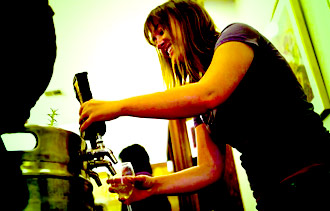Blog Archives
Beauty goes au naturale
Who doesn’t like the freshness of teal eyes, pink luscious lips, peach cheeks and a glowing complexion?
As the beauty industry takes a step forward, there is an equal number of men and women going back to basics.
Going organic seems to be the new mantra, what with organic soaps, creams, lotions, shampoos, lip balms and other beauty products taking a haute new avatar.
Ahalya Matthan, of Ally Matthan brand of natural fragrance and fragrance-based natural and handmade products for skin, hair, bath and personal care and Areev, a nationally available bath care range explores wellness with a holistic approach.
Natural beauty
Natural skin care is really a way of life. Plant oils, shea and cocoa butters make fantastic moisturisers, aloe and chamomile are soothing and minerals work magic to get rid of makeup lines for sensitive skin.
Look for some easy-to-find organic ingredients like rosemary, almond, wheatgerm, honey and milk in your beauty range.
Chemical free
More and more people are learning about the potential skin and hair problems associated with preservatives and other suspect chemicals in cosmetics.
Chemical-based products can give you instant results, but can damage your sensitive skin and hair in the long run.
It’s a myth that synthetic skin products work marvels as they contain chemicals that are not harmful in tiny dosages, but years of accumulated usage results in damage that you cannot see.
The skin absorbs nutrients and has the ability to heal itself, so it is a logical choice to choose whether you put a chemical or a natural product on your skin.
Go organic
If you are looking to lead a healthy life in the long run, choosing a natural or organic product is imperative.
By choosing an organic or a natural product, you are using ingredients that work with the natural systems of your skin. Here’s a know how on how to go au naturale:
Organic skin care implies that the products are made of ingredients derived directly from plants that have been cultivated without the use any chemical pesticides or fertilisers and contain no synthetic preservatives or additives.
Organic products are certified such that the end consumer can trace the origin of the farm where the ingredients were cultivated.
True organic products are hard to find as the low yield of plants cultivated without fertilizers makes them commercially unviable.
On the other hand a natural skincare product simply means that the ingredients are plant derived, cultivated with or without chemical interference, or they could alternatively mean that the ingredients are molecular clones of plant derivates.
Both products deliver the promise of the best natural ingredients for specific skincare.
Article excerpted from www.deccanchronicle.com
Does eating organic food make you a jerk?
A new study finds that going organic can make you feel smug about yourself — and act nasty to others

Those who insist on organic artichokes might be more judgmental than shoppers who are content with conventional products. Photo: CC BY: SummerTomato
Buying and eating organic food makes many people feel better about themselves. (Not coincidentally, organic products often have panderingly positive names, such as Honest Tea, Purity Life, and Smart Balance.) The flip side, according to a new study published in Social Psychological and Personality Science, is that organic eaters often look down on others, and aren’t shy about expressing their derision. Does going organic turn you into a jerk? Here’s what you should know:
How did researchers study the effects of organic food?
They divided 60 people into three groups: One was shown images of organics, such as spinach and apples; one was shown only comfort food, such as brownies; the third reviewed pictures of basics like rice and oatmeal. Then all three groups were asked to read vignettes about moral transgressions, such as cousins having sex or an ambulance-chasing lawyer hunting clients in an ER, and rank how bad the vignettes’ protagonists were on a seven-point scale. The participants were also asked how much time they would be willing to volunteer for a fictitious study.
And what did they find?
The crowd exposed to organic foods judged others more harshly. On average, they put the offenses described in the vignettes at 5.5 on the seven-point scale. The people exposed to pictures of comfort food were the most mellow, with average ratings of 4.89. The organic group was also stingier with their volunteering time, offering to help out for 13 minutes, compared to 19 minutes for rice-and-oatmeal group, and 24 minutes for the comfort food crowd.
How do experts explain these results?
Author Kendall Eskine, a psychology professor at Loyola University in New Orleans, chalks it up to something he calls “moral licensing.” People do something they see as a good deed, so they start feeling self-righteous. They also feel like “they have permission, or license, to act unethically later on,” Eskine says. “It’s like when you go to the gym and run a few miles and you feel good about yourself, so you eat a candy bar.” How comforting, says Doug Berry at Jezebel. “Moral of the story: Eating cookies makes you a better person.”
Article excerpted from www.theweek.com
Can Organic Food Reverse Cancer?
When my melanoma recurred in the lymph nodes under my arm, I was told by my oncologist that chemotherapy was pretty useless for melanoma, so they’d whip out the affected nodes and we’d hope for the best.
Post-op, I was lying in my hospital bed when two — quite separate — friends gave me A Time to Heal by Beata Bishop, the story of her healing her own melanoma almost 30 years ago using the Gerson Therapy. I knew I had to do something and her book convinced me that Gerson was it.
The therapy looked like a bit of a beast to do — 13 freshly-squeezed organic vegetable and fruit juices per day plus five coffee enemas, every day for at least 18 months to two years. On the diet front everything was organic. There was a thick vegetable soup to be eaten twice daily, and lunch and dinner consisted of a baked potato and vegetables and salad. A little oatmeal was permitted at breakfast. Everything else was forbidden. I couldn’t even wear make-up (though a little beetroot juice on the cheeks helped), and any chemical household products were banned. There was also some supplementation, including potassium and Lugol’s solution, some pancreatic enzymes, niacin and injectable B12.
The purpose of the therapy, devised by Max Gerson more than 60 years ago, is to massively detoxify the body thus helping the immune system to do the job it is designed to do. Their website describes it as “naturally reactivating your body’s magnificent ability to heal itself — with no damaging side effects.”
Despite the program’s rigidity, I seemed to be able to surrender to the routine of it. I had help with the juicing. And basically it was my job for those 18 months. The Gerson people counsel rest and even discouraged any exercise back in the mid-90s when I did it. But I liked the juices, I loved the enemas (designed to detoxify the liver) and even the food was doable. I finished my 18 months full-on and six months of a reduced program and, convinced I had put paid to the melanoma for good, I went back to my life.
Unfortunately the melanoma did come back around five years later, and that was the big nasty one when it recurred in my brain, spleen, stomach and lungs.
So why didn’t Gerson work for me? And how come I am still a proponent of using natural and alternative methods to heal cancer? Well, I still agree with the principles of the therapy. (The program that subsequently did the trick 10 years ago was based on similar principles, but with way more specific and targeted supplementation). And that, for me, is the key.
Cancer shows up in a toxic body. So to clean up, nourish and encourage it to work properly still seems completely logical to me. My theory — unproven — is that over the last 60 years or so our soil has got much more toxic and less fertile — even the soil that organic produce is grown in. Graham Harvey, author of We Want Real Food, told me that in the UK the supermarkets have encouraged their large scale growers to turn over some of their land to cash in on the demand for organic produce, and this has been done by obeying the minimum rules of organic farming rather than the spirit. Soil fertility is not something quickly achieved.
That, combined with the huge array of chemicals our 21st century bodies have to contend with, makes healing cancer through food alone a harder job and why I believe intense supplementation on top of a really clean organic regime is what worked for me. I would love to hear your experiences.
Article excerpted from www.huffingtonpost.com
Five Ways 2012 Academy Awards are Going Green
One of the most prestigious entertainment award shows is right around the corner. Actors, actresses, directors, writers and many other Hollywood moguls will unite at the 2012 Academy Awards on Sunday, so to help celebrate we’ve gathered the top five ways this year’s ceremony contributes to the environment. From dresses to gift bags to preparing for next year, the Oscars is sure to be a green hit.
1. Missi Pyle to Wear Sustainable Dress
The red carpet is always full of fabulous dresses. One to keep an eye on this year is Missi Pyle’s sustainable gown designed by Valentina Delfino, winner of the Red Carpet Green Dress design contest. Founded by James Cameron’s wife, Suzy Amis Cameron, the contest gives aspiring designers the chance to craft a sustainable dress for the Oscar red carpet. Delfino is this year’s lucky winner and now “The Artist” star will strut her stuff in the gown made from silk peace chiffon, recycled polyester and natural mineral dye. “It is an incredible honor for me to walk the most glamorous red carpet in the world in such a stunning and meaningful dress,” Pyle said.
2. Celebs Dine with Fresh California Cuisine
After hours of sitting in the audience, Academy Award attendees get famished, so thankfully they have Wolfgang Puck preparing delicious food. The famous chef will be cooking over 50 dishes for 1,500 guests at the Governors Ball in the Hollywood & Highland’s Grand Ballroom. For the past 18 years, Puck has showcased his talent and this year his buffet and lounge style food will feature fresh California produce and sustainable seafood. The menu includes beet salad with pistachio butter, burrata and citrus balsamic, lobster tacos and traditional favorites like macaroni and cheese. However, for dessert he is serving gold-dusted chocolate Oscars, which may cause some controversy like this year’s Golden Globes.
3. Actors and Actresses Celebrate with Green Parties
It wouldn’t be the Academy Awards without a magnificent party, especially before the show even begins! With several pre-parties to choose from, two sound worthwhile. First, Global Green USA hosted its ninth annual event with favorite green celebs in attendance like Adrian Grenier, Kyra Sedgwick, Ed Begley Jr. and Sophia Bush. Bush even showed up in a Chevy Volt electric car. In addition to promoting eco-awareness, an electric Xenon “lightcycle” from Evolve will was auctioned off. Can you say sweet?! The event also raised money for Global Green’s National Green Schools initiative and the launch of its Rio Earth Summit.
The second party that was an eco-hit was the Oxfam America Dinner hosted by Vanity Fair, Zenga clothing and Colin and Livia Firth. Colin may be an Oscar-winner for his role in “The King’s Speech,” but his wife deserves an award for her eco-fashion efforts. This particular dinner benefits not only Oxfam’s international relief efforts, but also Livia’s Green Carpet Challenge that has tried to get top designers to jump on the sustainable design bandwagon. If you remember, Livia made a fashion statement at the Golden Globes with her eco-friendly Armani dress. Livia also took time to tweet about her sustainable evening wear, “Wearing gorgeous dress #BeulahLondon #GCC2012 perfect as example of relieve women out of poverty @Oxfam India.” Hopefully, we’ll see more of this on Sunday.
4. Green Gift Bags Offered to Nominees
If being nominated for an Oscar isn’t enough, nominees also receive plentiful gift bags filled with goodies. This year, organic, eco-friendly and non-toxic gifts will be given away. For the nominees in major categories who don’t win, they will receive non-toxic, food safe kitchen products from Essential Safe Productsin their “Everybody Wins at the Oscars®” nominee gift baskets. Valued at over $250, the baskets include reusable items like produce bags, stainless steel snack containers and bamboo utensil sets. A $200 ESP gift certificate will also be inside.
Academy Award nominees and presenters will luckily take home an “Academy Awards Celebrity Gift Box” from Green PolkaDot Box, a company that provides organic and natural goods. The recycled boxes will be stuffed with a one-year GPDB savings membership, $75 in reward points and 48 organic products, such as Eden’s Pumpkin Seeds, Vermont Soap’s Oatmeal Lavender bars and St. Dalfour’s Black Raspberry Conserves. Well, at least the noms (who don’t win) won’t go empty-handed, but of course I’d rather go home with an Oscar.
5. Oscars Prepare Greenness for Next Year
The Oscars aren’t even here yet, and the Academy of Motion Picture Arts and Sciences is already planning for next year. They’ve partnered with Everyone Counts Inc. to develop an electronic voting system, rather than a paper one. This new electronic ballot will not change the traditional tabulation of Academy members’ votes. It will also remain tightly secured. Sounds like the 85th awards show is off to a good start!
It’s nice to see how the Academy Awards contribute to the environment, even in the smallest of ways. Also, be sure to check out our other gallery of “The Ten Most Charitable Oscar Nominees” and see how the most talented actors and actresses are giving back to others.
Article excerpted from www.ecorazzi.com
Austria comes out top at organic trade fair
Austria’s producers came out top in the organic stakes at Nuremberg’s BioFach trade fair over the weekend. The event in Germany which hosted some 2,400 exhibitors, 100 of whom were from Austria, was a roaring success for the country’s organic industry whose products proved hugely popular.
“Here in Germany, the whole world has been very impressed by the quality of our products,” explained Katja Huber from the organic butchers Sonnberg in Upper Austria. Companies from around the world presented their produce at the four-day fair which has long been pioneering the organic sector.
“Organic food is completely established in everyday life in Austria thanks to the producers. The entire marketplace is continually moving upwards,” said managing director of AMA (Agarmarkt Austria Marketing) Dr. Stephan Mikinovic.
The world’s organic industry saw a turnover of 45 billion Euros last year with 21 billion Euros of that in Europe, a 228 per cent increase from the year 2000 all despite economic and financial crisis. “Despite all the talk of saving and crisis, our organic industry has survived well and in fact suffered no significant losses”, said Mikinovic.
The USA and Europe are currently leading the organic market with 10 million hectares of organic farmland being worked in Europe alone. When looking at organic share in relation to available arable land, Austria is a world leader with 20 per cent. Only the Falkland Islands and Liechtenstein have a higher organic share.
Over the course of the last year Austrians spent around 304 million Euros on organic products with fruit, milk and meat products proving popular. The drive from supermarkets to create their own organic lines hugely benefits Austrian farmers, suggested Rudolf Vierbauch from Bio-Austria. “Austria would never have this organic turnover if the chains behind the strategy didn’t promote organic products,” said Vierbauch.
Despite currently being at a lower level, experts predict the areas of Middle and Eastern Europe to have the greatest growth potential in the organic market. Organic turnover in Croatia for example has increased twenty fold in the last six years.
Article excerpted from www.austriantimes.at
Viking Found Organics on Mars, Experiment Confirms
Using Mars-like soil taken from Atacama Desert, a study confirms Mars has organics, and Viking found them.
THE GIST
- A reanalysis of Mars Viking experiments shows the probes did find organics.
- The result was not initially understood due to the strong oxidation effects of a salt in the Mars soil known as perchlorate.
- A follow-up study on perchlorate-enhanced soil similar to what’s found on Mars revealed fingerprints of combusted organics.

The Viking 1 Lander, illustrated in this model, touched down on the western slope of Mars' Chryse Planitia (the Plains of Gold) on July 20, 1976.
More than 30 years after NASA’s Viking landers found no evidence for organic materials on Mars, scientists say a new experiment on Mars-like soil shows Viking did, in fact, hit pay dirt.
The new study was prompted by the August 2008 discovery of powerful oxygen-busting compounds known as perchlorates at the landing site of another Mars probe called Phoenix.
Scientists repeated a key Viking experiment using perchlorate-enhanced soil from Chile’s Atacama Desert, which is considered one of the driest and most Mars-like places on Earth, and found telltale fingerprints of combusted organics – the same chemicals Viking scientists dismissed as contaminants from Earth.
“Contrary to 30 years of perceived wisdom, Viking did detect organic materials on Mars,” planetary scientist Christopher McKay, with NASA’s Ames Research Center in California, told Discovery News. “It’s like a 30-year-old cold case suddenly solved with new facts.”
“If the Viking team had said ‘Well, maybe there’s perchlorate in the soil,’ everybody would have said they’re crazy — why would there be perchlorates in the soil? It was only by having it pushed on us by Phoenix where we had no alternative but to conclude that there was perchlorate in the soil … Once you realize it’s there, then everything makes sense,” McKay added.
The Viking team’s verdict that Mars lacked organics was the lynchpin argument against another Viking experiment that looked for signs of microbial life. In the experiment, a bit of nutrient-laced water was added to a sample of Martian soil.
The air above the soil was then monitored for signs that the nutrients had been metabolized. The instrument detected tracer gases the first time the experiment was done, but subsequent runs did not. The results were considered inconclusive and remain contested.
New evidence for organics on Mars does not mean Viking found life, cautions McKay.
“Finding organics is not evidence of life or evidence of past life. It’s just evidence for organics,” he said.
But if NASA had realized there were organics on Mars, there might not have been a 20-year hiatus in sending landers for follow-up studies, said Rafael Navarro-González, with the Institute of Nuclear Science at the National Autonomous University in Mexico.
“We might have had continuing missions,” Navarro-González told Discovery News.
NASA plans to launch a follow-up mission to look for organics on Mars in November.
Article excerpted from www.news.discovery.com














